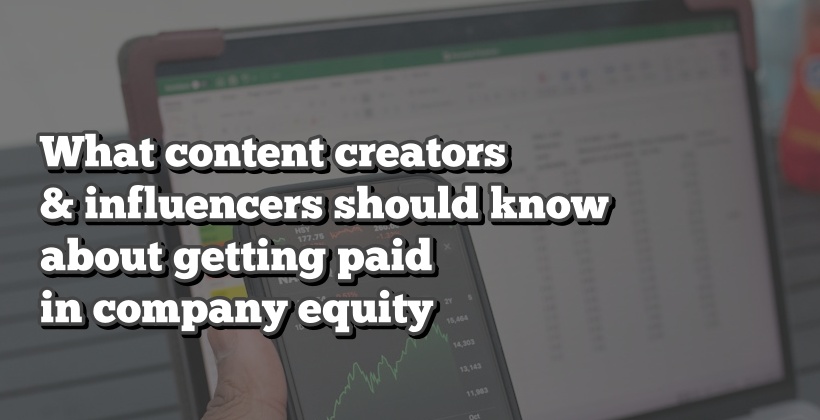
How brands use equity to exploit content creators & influencers
Last updated on September 28th, 2023 at 08:47 pm
It’s no secret that Black creators and influencers aren’t paid our worth. We are often severely underpaid compared to non-Black creators. There are many reasons for this, including racism & discrimination. Another reason is a lack of knowledge in how to navigate getting paid as a creator or influencer.
Let’s talk about equity and how companies are using equity to either underpay creators or to get away with not paying creators at all.
Two examples in recent news inspired me to write about this:
David Warren & Triller
David Warren is a content creator with 500k+ followers and 14M+ views on TikTok who signed a deal with Triller, an app that’s supposed to be a TikTok rival. According to an article in The Washington Post, Triller promised Warren and other creators $4,000 per month, half in equity, to post videos on their platform every month. According to Warren and other creators, they have not been paid for their work, nor have they been allocated Triller shares.
Kyle The Hooligan & FN Meka
You might have heard about the catastrophe that is FN Meka. A virtual rapper, backed by the company Factory New, has gone viral several times because it’s a caricature of Black rappers. Kyle The Hooligan, a Houston-based rapper, and actual person, is the voice behind FN Meka. In this Vice interview, he states that he wrote and performed songs and was a part of the team who crafted and shaped FN Meka. He was promised equity as “payment” for his work, but was never paid and completely ghosted by Factory New.
This is not a comprehensive guide on how to get paid as a creative or influencer. This is also not financial advice or legal advice. Eventually, I want to turn this into a series or a guide, but for now, this is a quick overview with resources to introduce you to the concept of equity.
Things to know about equity
What is equity?
Equity is shares (also known as stocks) in a company.
Equity is usually offered to full-time permanent employees and/or long-term project collaborators. The equity is often offered in addition to salary, benefits, and other incentives.
Typically, people only accept (or purchase) equity in a company if they believe in that company and are personally invested in the growth of that company. The whole point of having company shares is to make additional money. The idea is to obtain the shares at a lower price, and then sell those shares for a higher price in the future.
Types of equity
There are different types of equity. If the company is public, then the company might offer Restricted Stock Units (RSUs). The price of each share depends on how the company is doing in the stock market, which means that the share price can change at any time, and sometimes drastically.
If the company is private, then it gets much more complicated. But to be clear, it is highly unlikely that you can pay this month’s (or next month’s) bills with equity.
What are some of the pros & cons of equity?
Call it a hot take or an unpopular opinion but equity, in a lot of cases, is not an acceptable form of payment. Especially, if “getting paid in equity” is the only way you’ll be “paid”.
There are stories of people becoming millionaires (and billionaires) thanks to the equity they held in a company after the company was acquired (bought by another company) or went public.
But there are also stories of people whose equity became worthless or they lost a lot of their would-be earnings to taxes.
Must read: How to Turn a Gifted Collaboration into a Paid Sponsorship
Additional resources to learn more about equity
The point of this breakdown is not to discourage you from getting equity, but to inform you of the nuances and complications that come with receiving equity from a company.
With equity, there’s an amazing opportunity to make a lot of money, but there are serious risks and pitfalls involved as well.
I kept it pretty light here but if you want to learn more, here’s some additional reading:
Levels.fyi
This Levels.fyi blog post has a section on equity as it relates to total compensation for tech employees. It focuses mainly on RSUs, and gives an example of a vesting schedule. Another Levels.fyi post is a deeper dive into equity and details how to negotiate equity as a part of your job offer. And it lists questions you need to ask about your equity offer.
U.S. Securities & Exchange Commission (SEC)
The SEC explains equity but mainly from the perspective of having shares from a public company. They list some of the types of stocks and risks associated with stocks.
Venture Deals by Brad Feld & Jason Mendelson
If you are an entrepreneur planning to raise money for your business through angel investors, venture capitalists (VCs), equity crowdfunding, etc, then this is a great read. Note: This is an affiliate link, which you can read more about on the Disclaimer page.
What else do you want to know about equity?
Email me at hey [at] profoodmaker [dot] com, or tweet @profoodmakerpod to let me know your thoughts and questions about equity for future articles.

